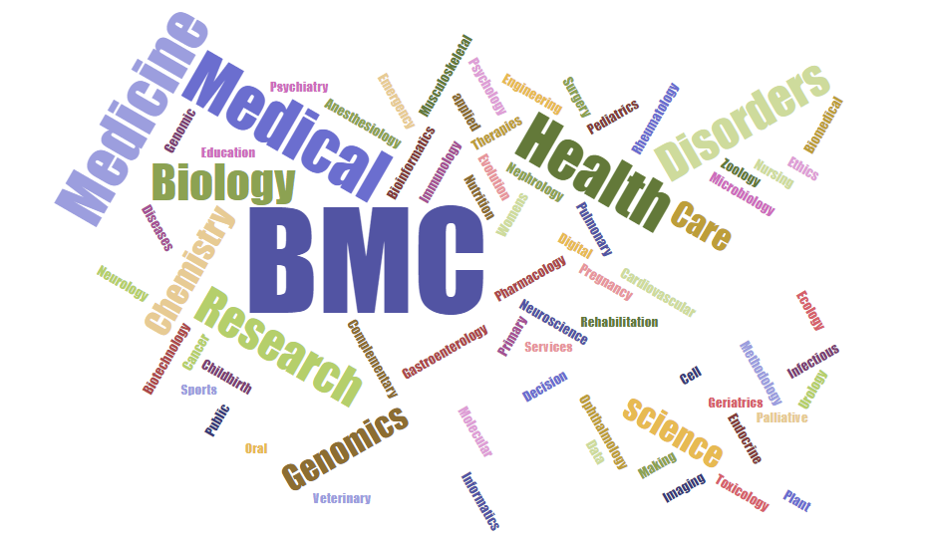Highlights of the BMC Series - September 2025
Published in Healthcare & Nursing, Microbiology, and General & Internal Medicine

BMC Pregnancy and Childbirth: The prospective association of prenatal anxiety symptoms in mothers and fathers with general child development 14 months postpartum and the mediating role of parent-child bonding: a mediation analysis within the longitudinal cohort study DREAM
Anxiety during pregnancy is a common yet often overlooked mental health concern that affects not only mothers but fathers as well.

Ute Grabowsky via Getty Images
A recent study in BMC Pregnancy and Childbirth examined data from the longitudinal DREAM study, which followed 1,544 mothers and 985 fathers, researchers explored how prenatal anxiety symptoms relate to parent-child bonding and early child development up to 14 months after birth. The study found that while mothers reported higher anxiety levels during pregnancy, both parents showed similar bonding quality with their infants. Interestingly, prenatal anxiety was linked to weaker parent-child bonding, but this connection disappeared once postnatal depression was considered, suggesting that depression may play a more central role in shaping early family relationships. Importantly, weaker parent-child bonding was associated with poorer child development outcomes, highlighting bonding as a crucial pathway for healthy growth.
These findings underscore the need to include fathers in perinatal research and mental health care, and to prioritize early interventions that strengthen bonding when either parent experiences anxiety or depression.
BMC Nutrition: Promoting healthy and sustainable diets through food service interventions in university settings: a scoping review
Universities and colleges aren’t just places of learning—they’re also influential food environments that can shape the eating habits of thousands of students and staff.
.jpg)
Recent research published in BMC Nutrition shows that food service interventions in these settings can promote healthier and more sustainable diets, helping to reduce food waste and support environmentally friendly practices. A scoping review of 206 studies covering 273 interventions found that common strategies include menu labelling, increasing availability of healthy and sustainable options, and awareness-raising campaigns. While most studies were short-term and focused on North America and Europe, the evidence highlights the potential of multi-pronged approaches to influence dietary choices and sustainability outcomes.
The evidence is clear: university food services have the power to shape healthier and more sustainable eating habits for thousands of students and staff. By combining strategies like menu labelling, improved healthy options, and educational campaigns, campuses can not only improve diet quality but also reduce food waste and environmental impact. To fully realize this potential, future interventions must adopt robust study designs, measure both health and sustainability outcomes, and track long-term effects.
BMC Infectious Diseases: Association between mental health symptoms and autoimmunity in patients with long COVID
Long COVID continues to challenge both patients and clinicians, with a surprising number of individuals experiencing lingering symptoms months after infection.
.jpg)
Recent research published in BMC Infectious Diseases highlighted that 57% of participants with a prior COVID-19 infection reported experiencing long COVID. Among these individuals, 21.2% reported depressive symptoms, 31.2% experienced anxiety, and 28.7% suffered from insomnia. Importantly, the study revealed a notable association between these mental health symptoms and autoantibody positivity, particularly the presence of antinuclear antibodies (ANA) alone or in combination with anti-thyroid peroxidase (anti-TPO) anti-bodies. These findings suggest that mental health symptoms in long COVID may be linked to underlying autoimmune activity, pointing toward shared biological pathways between psychological and immune responses. The authors highlighted that this connection strengthens the view of long COVID as a multisystem condition, requiring an integrated medical approach.
The authors emphasized the urgent need for close collaboration among consultation-liaison psychiatrists, immunologists, rheumatologists, and pain medicine specialists—both in clinical practice and research—to fully understand and address these interrelated symptoms. By bridging mental health and immunological care, future studies can pave the way for more targeted interventions and holistic management of long COVID and its lasting impact on mental well-being.
BMC Primary Care: Social prescribing for informal carers: a pre-post study
Informal carers often experience compromised mental and physical wellbeing due to their caring responsibilities. While social prescribing shows promise in supporting various populations, evidence for its effectiveness in supporting carers is limited.

Natalia Gdovskaia via Getty Images
The study published in BMC Primary Care emphasized the impact of a social prescribing program on health-related quality of life and other wellbeing measures among Australian adult carers. Data from 821 participants (December 2021–August 2024) included 93 carers (11.3%). Over 12 weeks, link workers co-designed personalized care plans connecting carers to community services. Carers received more social prescriptions than non-carers (mean difference = 2.05, p = .002), mainly for mental/emotional (54%) and physical wellbeing (45%). Post-intervention, carers showed significant improvements in quality of life, mental wellbeing, self-reported health, and psychological distress (all p < .001), with reduced GP visits (p = .002). Most support was delivered via phone (98%), emphasizing the effectiveness of remote engagement.
Social prescribing appears to be an effective intervention for supporting carers’ wellbeing and reducing healthcare utilisation. The high uptake of phone-based support suggests potential for scalable remote delivery. Future research with larger samples is needed to examine program benefits across diverse demographic groups and varying intensities of caring responsibilities.
BMC Gastroenterology: Impact of cholecystectomy on Metabolic dysfunction-Associated Steatotic Liver Disease and metabolic syndrome: a 6-month prospective cohort study
Cholecystectomy, one of the most performed surgeries, may influence metabolism through changes in bile acid regulation. Although early research suggested a possible link between gallbladder removal and Metabolic Dysfunction-Associated Steatotic Liver Disease (MASLD) or metabolic syndrome, the evidence has been inconclusive. This 6-month prospective study aimed to clarify the metabolic impact of elective cholecystectomy in a Middle Eastern population.
.jpg)
This recent study published in BMC Gastroenterology included 51 patients undergoing cholecystectomy and 49 matched controls, with MASLD grade and metabolic syndrome assessed at baseline and after six months using ultrasonography and standard clinical criteria. Post-surgery, the cholecystectomy group showed decreased BMI and fasting blood sugar, but also a concerning increase in systolic and diastolic blood pressure. In comparison, controls improved in fasting blood sugar and HDL cholesterol. Logistic regression indicated that cholecystectomy was linked to a higher risk of developing metabolic syndrome (OR = 9.63, p < 0.05).
These findings suggest that while gallbladder removal may improve some metabolic parameters, it can also elevate blood pressure and increase metabolic syndrome risk, underscoring the need for careful metabolic monitoring after surgery.
Follow the Topic
-
BMC Infectious Diseases

This journal is an open access, peer-reviewed journal that considers articles on all aspects of the prevention, diagnosis and management of infectious and sexually transmitted diseases in humans, as well as related molecular genetics, pathophysiology, and epidemiology.
-
BMC Primary Care

Previously known as BMC Family Practice, this is an open access, peer-reviewed journal that considers articles on all aspects of primary health care research.
-
BMC Nutrition

BMC Nutrition is an open access, peer-reviewed journal that considers articles on all aspects of nutritional sciences.
-
BMC Gastroenterology

This is an open access, peer-reviewed journal that considers articles on all aspects of the prevention, diagnosis and management of gastrointestinal and hepatobiliary disorders, as well as related molecular genetics, pathophysiology, and epidemiology.
-
BMC Pregnancy and Childbirth

This is an open access, peer-reviewed journal that considers articles on all aspects of pregnancy and childbirth. It welcomes submissions on the biomedical aspects of pregnancy, breastfeeding, labor, maternal health, maternity care, trends and sociological aspects of pregnancy and childbirth.
Related Collections
With Collections, you can get published faster and increase your visibility.
Bridging primary and palliative care
BMC Primary Care is calling for submissions to our Collection, Bridging primary and palliative care. The integration of primary and palliative care is increasingly recognized as essential for improving the quality of life for patients with serious illnesses. This Collection invites research that examines innovative models of care that bridge these two critical domains. The interplay between primary care and palliative care can enhance the patient experience by addressing not only medical needs but also psychosocial and spiritual aspects of care. As healthcare systems evolve, understanding how these two areas can collaborate effectively is crucial for optimizing patient-centered approaches and ensuring comprehensive support for individuals and families.
Advancements in this field highlight the importance of shared decision-making and advanced care planning as mechanisms to enhance communication between healthcare providers and patients. By fostering a collaborative environment, we can empower patients to express their preferences and values concerning their care journey, particularly in the context of end-of-life decisions. Research has shown that integrated approaches lead to better symptom management, reduced hospitalizations, and increased patient and family satisfaction. Ongoing research could transform how we think about and deliver care for patients with serious illnesses.
In this Collection, we welcome submissions that span a wide array of topics, including but not limited to:
- Integrating advanced care planning in primary care
- Shared decision-making in end-of-life care
- Models of palliative care in primary care settings
- Enhancing communication between care teams
All manuscripts submitted to this journal, including those submitted to collections and special issues, are assessed in line with our editorial policies and the journal’s peer-review process. Reviewers and editors are required to declare competing interests and can be excluded from the peer review process if a competing interest exists.
Publishing Model: Open Access
Deadline: Jun 08, 2026
Indigenous health and well-being
BMC Primary Care is calling for submissions to our Collection, Indigenous health and well-being. Historically, Indigenous communities have faced significant health disparities driven by systemic inequalities, cultural disconnection, and barriers to accessing healthcare. This Collection seeks to address these issues by gathering research that highlights the unique health challenges faced by Indigenous peoples, including chronic diseases, mental health issues, and the impact of social determinants on health outcomes. By amplifying Indigenous voices and perspectives, we aim to foster a deeper understanding of their health needs and aspirations.
The significance of researching Indigenous health lies in its potential to inform and transform healthcare practices, policies, and systems to achieve health equity. As research grows, we anticipate developments in the field of Indigenous health that may lead to the co-creation of innovative healthcare models. By fostering collaborations between Indigenous communities and healthcare providers, there is potential for enhanced accessibility, culturally appropriate care, and the development of policies that prioritize Indigenous health and well-being. Future studies may also uncover new insights into the role of traditional practices in modern healthcare systems, ultimately bridging the gap between Western medicine and Indigenous healing practices.
In this Collection, we welcome submissions that span a wide array of topics, including but not limited to:
- Barriers to healthcare access for Indigenous populations
- Community health initiatives in Indigenous communities
- Health equity strategies for Indigenous well-being
- Cultural competency in Indigenous healthcare
This Collection supports and amplifies research related to SDG 3: Good Health and Well-being and SDG 10: Reduced Inequalities.
All manuscripts submitted to this journal, including those submitted to collections and special issues, are assessed in line with our editorial policies and the journal’s peer review process. Reviewers and editors are required to declare competing interests and can be excluded from the peer review process if a competing interest exists.
Publishing Model: Open Access
Deadline: Aug 05, 2026





Please sign in or register for FREE
If you are a registered user on Research Communities by Springer Nature, please sign in